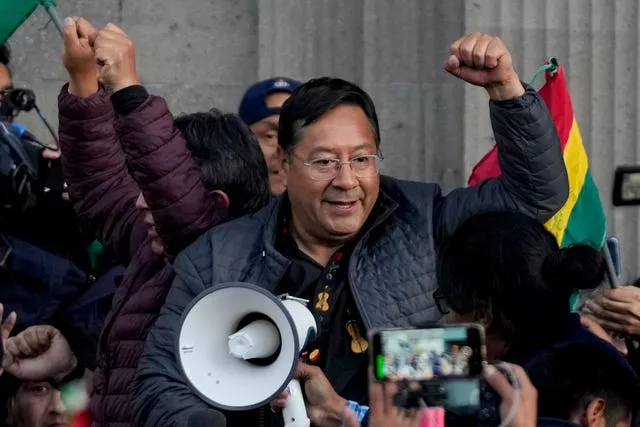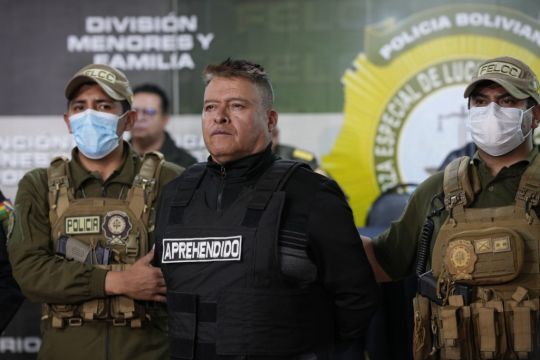A senior Bolivian general has been arrested after armoured vehicles rammed the doors of the government palace in what the country's president called a coup attempt.
Forces led by army chief General Juan Jose Zuniga seemed to take control of the government of Bolivian president Luis Arce as they vowed to “restore democracy”, but he pledged to stand firm and named a new army commander who immediately ordered the troops to stand down.
The soldiers soon pulled back, along with a line of military vehicles, ending the rebellion after three hours, and hundreds of Mr Arce’s supporters rushed the square outside the palace, waving Bolivian flags, singing the national anthem and cheering.

Government minister Eduardo del Castillo said former navy Vice Admiral Juan Arnez Salvador was also taken into custody.
“What was this group’s goal? The goal was to overturn the democratically elected authority,” Mr del Castillo told journalists in announcing the arrests.
Late on Wednesday, defence minister Edmundo Novillo said “everything is now under control”, adding that Bolivia had seen a “failed coup”.
The apparent coup attempt came after the nation of 12 million people faced months of tensions between Mr Arce and his one-time ally, former leftist president Evo Morales, over control of the ruling party. It also came amid a severe economic crisis.
The clashes have paralysed the government’s efforts to deal with the economic crisis. Mr Morales’s allies in Congress have consistently thwarted Mr Arce’s attempts to take on debt to relieve some of the pressure.
Zuniga referenced that paralysis during the rebellion, telling reporters the military was tired of the infighting and was seeking “to restore democracy”.

“We are listening to the cry of the people because for many years an elite has taken control of the country,” he said, adding that politicians are “destroying the country: look at what situation we are in, what crisis they have left us in.
“The armed forces intend to restore the democracy, to make it a true democracy.”
The crisis began in the early afternoon as the streets of La Paz started filling with soldiers. Mr Arce tweeted that the troop deployment was irregular and soon he and other political figures warned of an attempted coup.
The apparent attempt to depose the sitting president seemed to lack any meaningful support, and even Mr Arce’s rivals closed ranks to defend democracy and reject the uprising.
In a twist, Zuniga claimed in comments to journalists before his arrest that Mr Arce himself had told the general to storm the palace in a political move.
“The president told me, ‘The situation is very screwed up, very critical. It is necessary to prepare something to raise my popularity’,” the general said.
Justice minister Ivan Lima denied Zuniga’s claims, saying the general was lying and trying to justify his actions, adding that he will face justice.

Prosecutors will seek the maximum sentence of 15 to 20 years in prison for Zuniga, Mr Lima said, “for having attacked democracy and the Constitution”.As the crisis unfolded on Wednesday, Mr Arce confronted Zuniga in the palace hallway, as shown on Bolivian television. “I am your captain, and I order you to withdraw your soldiers, and I will not allow this insubordination,” the president said.
Surrounded by ministers, he added: “Here we are, firm in Casa Grande, to confront any coup attempt. We need the Bolivian people to organise.”
Less than an hour later, Mr Arce announced new heads of the army, navy and air force amid the roar of supporters, and thanked the country’s police and regional allies for standing by him. He said the troops who rose against him were “staining the uniform” of the military.
“I order all that are mobilised to return to their units,” said the newly named army chief Jose Wilson Sanchez. “No one wants the images we’re seeing in the streets.”
Shortly after, the armoured vehicles drove out of the plaza, tailed by hundreds of military fighters as police in riot gear set up blockades outside the government palace.
Bolivia has seen intensifying protests in recent months over the economy’s decline from one of the continent’s fastest-growing two decades ago to one of its most crisis-stricken.
Mr Arce and Mr Morales have been battling for the future of Bolivia’s splintering Movement for Socialism ahead of elections in 2025.







